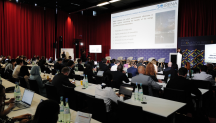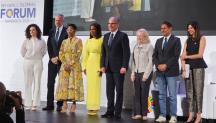

Business and Policy Leaders Commit to Further Action on Global Energy Transition for a Just Climate Future for All
Newsletter
Marrakech, Morocco, 11 November 2016 – With the Paris Climate Agreement having just come into force, leaders from a wide range of sectors are coming together on Energy Day at the UN Climate Change Conference in Marrakech (COP22, to 18 November) to demonstrate action on global efforts to decarbonise our energy system. Energy Day is being jointly organized by the International Renewable Energy Agency (IRENA) and Sustainable Energy for All (SEforALL), in cooperation with the Moroccan Agency for Sustainable Energy (MASEN) and the Moroccan Agency for Energy Efficiency (AMEE), as part of a series of thematic days – hosted by the Climate Champions – and held under the auspices of the COP22 Presidency.
The Paris Agreement set urgent climate action firmly in the context of sustainable development, with conversations today focusing on how we achieve the Sustainable Development Goal Number 7 (to ensure access to affordable, reliable, sustainable and modern energy for all), and secure universal access to affordable, reliable, sustainable and modern energy that can connect the current 1.1 billion people in the world who have little or no access to electricity, and the 2.9 billion people that still rely on smoky, dangerous solid fuels for cooking and heating.
Discussions and commitments made throughout the day will include:
Announcements from the RE100 and EP100 initiatives
- Pre-launch commitments to “One for All” – a global campaign to be launched in early 2017 that seeks to mobilize new forms of capital and new investors to end energy poverty before 2030.
- Developments in the Small Island Developing States (SIDS) Lighthouses Initiative, launched in Paris last year aimed at supporting islands in the transformation of their energy systems.
- Developments related to the Africa Renewable Energy Initiative (AREI).
- The remarkable renewable energy transformation of Morocco, this year's COP hosts.
“Closing the energy gap offers us one of the greatest economic opportunities of our lifetime,” said Rachel Kyte, CEO and Special Representative of the UN Secretary-General for Sustainable Energy for All. “In 2016, the world needs an energy system that allows universal access, supports new jobs and meets our aspirations of a just, fair future for all. To achieve this, promises made must be promises kept.”
“The climate objectives agreed in Paris require nothing less than the radical decarbonisation of the global economy,” said Adnan Z. Amin, IRENA Director-General. “Transitioning rapidly to a future fuelled by renewable energy, combined with improving energy efficiency, is the single most effective way to stave off catastrophic climate change while providing citizens with a better quality of life. But the pace and scale of change needs to dramatically increase if we are to fulfil the promise of the Paris Agreement. Governments need to create the necessary policy and finance frameworks to catalyse a groundswell of initiatives, as the private sector develops its own decarbonisation strategies. This is well within our reach.”
New announcements made on Energy Day include:
- New commitments from Dalmia Cement and Helvetia were announced during the press conference, which saw them publicly commit to use 100% renewable power across their operations and join RE100; a global, collaborative initiative with more than 80 of the world’s most influential companies who are working to massively increase demand for – and delivery of – renewable energy.
- Announcements also came from Philips Lighting and Swiss Re who have committed to double their energy productivity and join EP100, a global campaign that works with companies to maximize the economic benefits of every unit of energy they consume.
- The RE100 and EP100 initiatives are designed to work together to provide the least-cost decarbonisation pathway for business, and today three companies – Dalmia Cement, Philips Lighting and Swiss Re – become the first companies to be part of both campaigns led by The Climate Group, in partnership with CDP and the Global Alliance for Energy Productivity.
- Together, RE100 companies are collectively creating over 100TWh of demand for renewable electricity – more than enough to power Morocco three times over. Members speaking today include Alejandro Agag, CEO, Formula E, Kevin Rabinovitch, Global Sustainability Director for Mars, and Bill Weihl, Director of Sustainability, at Facebook. Mr. Rabinovitch announced a new wind power purchasing agreement to power Mars' Mexican operations.
- A new private-sector led initiative, the Renewable Energy Buyers Alliance (REBA), was also announced - REBA builds connections between corporate electricity demand and renewable energy supply.
- Since COP21, the SIDS Lighthouses Initiative grew rapidly to include 39 States and 19 development partners and developed an innovative island renewable energy support programme. 19 renewable energy projects in the Caribbean were registered on the Sustainable Energy Marketplace, representing an investment volume of $1 billion. Two island States, Antigua and Barbuda and Cabo Verde, were selected to receive funding from the IRENA/ ADFD Project Facility and other co-financiers for a total of $45 million. In addition the UAE have recently announced $50 million for renewable energy projects in the Caribbean States.
Alejandro Agag, CEO, Formula E commented: "Electric vehicles reach their full potential when coupled with renewable energy charging - which is why all the fully-electric Formula E cars are powered by a revolutionary zero-emission glycerine. The future is electric!”
About Global Climate Action
France and Morocco's global climate champions have set out their detailed agenda to boost cooperative action between governments, cities, business, investors and citizens to cut emissions rapidly and help vulnerable nations adapt to climate impacts and build their own clean energy, sustainable futures.
Message from the COP22 climate champions
“A year after COP 21, the great dynamic of climate action is now growing strong. As we all gather to Marrakech time has come to start to take stock of what has been achieved during the last year. To be consistent with the long-term goals, all actors will have to work together, not only to achieve the national targets of the NDCs, but also to go further and bridge the gap of emissions. This sense of urgency should guide us all into accelerating immediate efforts and delivering ambitious action. We must identify what concrete policy options and what tools we will have to mobilize in the short term. The science is clear: the path towards achieving the long-term goals should bring us to peaking GHG emissions by 2020. This is a challenge, and we are not there yet. On the current trends, we will be in 2030 between 11 to 14 GT above Paris-compatible pathways. The purpose of these days is to strengthen all efforts and take them to the next level to stay on track for the objectives: stay well below 2°C and if possible 1,5°C, increase adaptation and resilience capacities and reorient financial flows. It is our responsibility, as champions, to make the link between the real world and the COP process. Political leaders from all around the world should hear and be inspired by the solutions at our reach.” – Climate Champions, Laurence Tubiana (France) and Hakima El Haité (Morocco)
Further Background
With the Paris Agreement having entered into force on November 4th, companies and investors are now focused on the implications for their business models, the risks of energy intensity and the opportunities of new products and services for the low carbon energy system. Commitments made before and in Paris are now being turned into action and new commitments are being made.
In this carbon constrained world the private sector increasingly sees energy productivity as the crucial but often overlooked ‘first fuel’. It can deliver 40% of necessary emission reductions, while reducing the world’s fossil fuel bill by more than $2 trillion and creating more than six million jobs globally by 2020. Companies are gearing up to seize the opportunities that stem from the recent Kigali Amendment to the Montreal Protocol heralding an era of super efficiency in super cooling that can be matched by super efficiency across many devices and appliances that a growing and more affluent world will need.
The growing number of commitments by major companies and investors shows that business continues to take a leadership role alongside governments on climate change. It also demonstrates the strengthening business case for all sources of renewable energy as costs continue to fall, making the decarbonisation of the global energy system more economically possible than ever before. Private-sector climate action is crucial, alongside robust government policy to boost confidence and enable long-term investment for a clean and fair energy future. Doubling the global share of renewables by 2030, to 36 percent, would generate 50 percent of the CO2 emissions reductions needed to keep global average temperature rise below 2° C, and generate 24 million jobs along the way.
The deployment of renewables in the power sector is on the right path, but more needs to be done in sectors like transport, industry and buildings. The Biofuture Platform, being launched in Marrakech by the government of Brazil, aims to be a country-led, action-focused, platform for policy dialogue and collaboration among leading countries, organizations, academia and the private sector. It will specifically focus on scaling up low carbon transport fuels, biorefining and the advanced bioeconomy.
In addition, multi-stakeholder partnerships in support of advancing renewable energy launched last year during COP21 are continuing to gather momentum. The Global Geothermal Alliance, has expanded to include close to 70 member countries and partner institutions across the globe. In an effort to unlock geothermal investments on a global scale, the Alliance aims to provide customised support to regions and countries with geothermal market potential, facilitate the exchange of experience among key geothermal stakeholders, and provide technical assistance, advisory and capacity building to foster an enabling environment for geothermal energy development.
The Africa Renewable Energy Initiative (AREI), launched by African heads of state at COP21, aims to increase Africa’s renewable energy capacity by 10 GW by 2020 and 300 GW by 2030. Ten donors have pledged to mobilise 10 billion dollars to contribute to reaching its 2020 target. Leaders and partners of this initiative will report on concrete progress made since COP21, including implementing donor commitments on the ground.
Participants at Energy Day recognise that the Paris Agreement sets urgent climate action firmly in the context of sustainable development and the fight against poverty. The transformation of global energy systems must be a just one, leaving no one behind.
This ambition is reinforced in the U.N.’s Sustainable Development Goal 7, which calls for securing universal access to affordable, reliable, sustainable and modern energy. The fact that 1.1 billion people in the world today have little or no access to electricity, and 2.9 billion still rely on smoky, dangerous solid fuels for cooking and heating, requires urgent attention. Within this, women and children are disproportionality affected by climate change and energy poverty. Unlocking finance that supports energy access will directly play a role in not only women’s empowerment, but their safety, health and prosperity – building stronger communities around the world in doing so.




